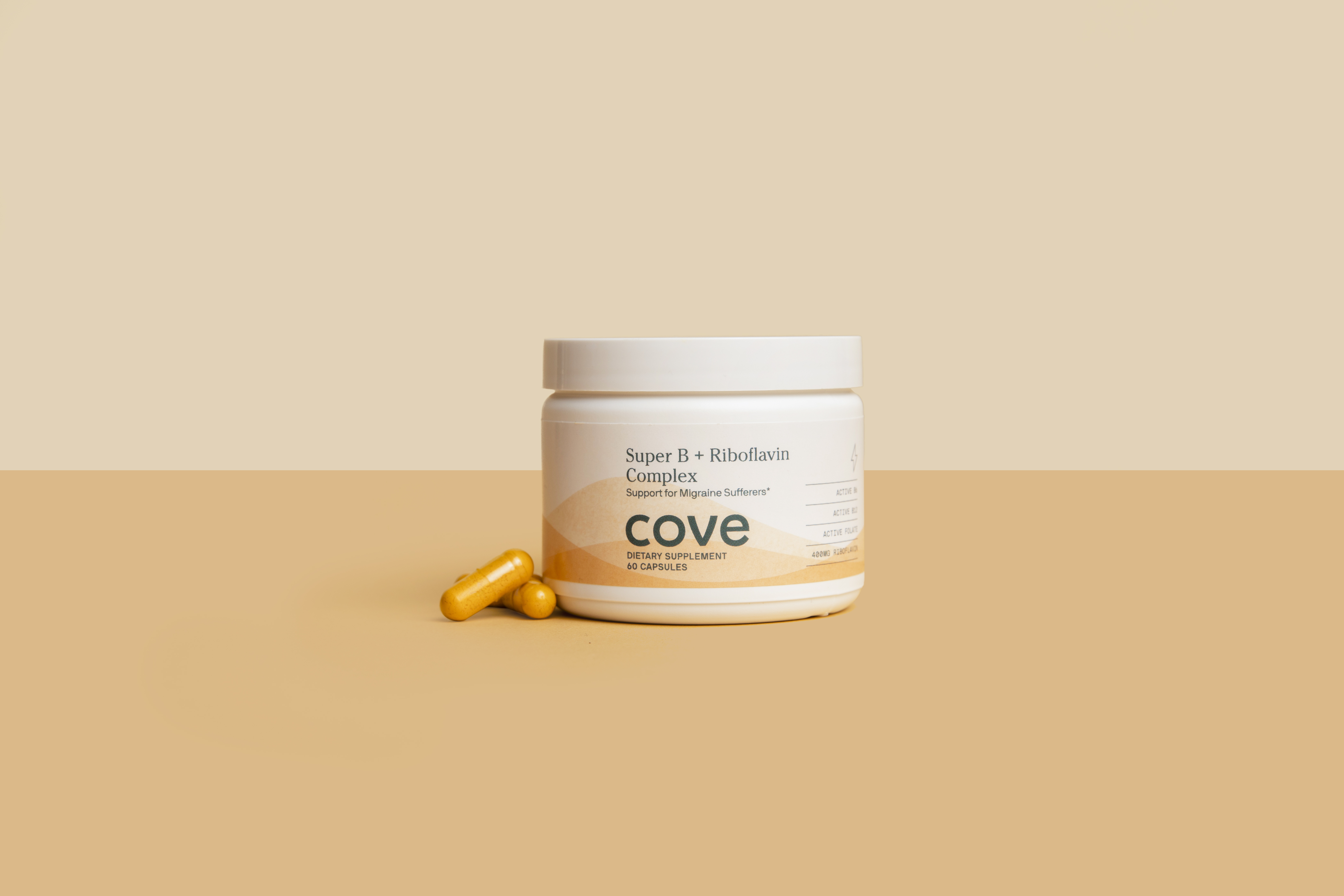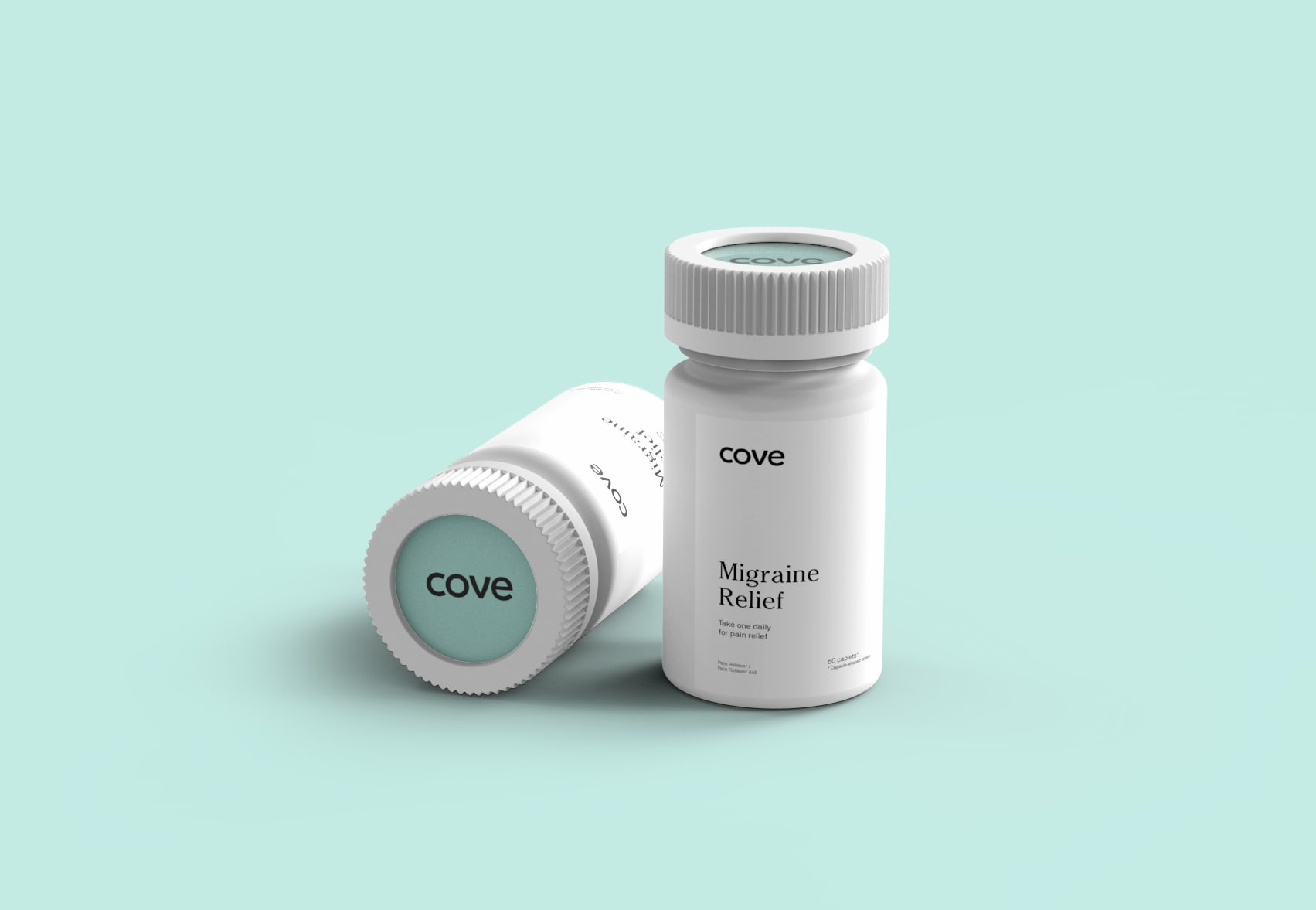If you’ve searched for natural migraine remedies online, you’ve probably heard a lot of big claims about how some supplements can put a stop to your debilitating headaches. As we all know, not everyone on the internet is careful about spreading information, even when the evidence is thin or just plain nonexistent.
That’s why we’ve done our research and decided to tell you all about one of the few vitamins that really can help prevent migraine headaches: riboflavin (a.k.a. vitamin B2).
Ready to learn all there is to know about this natural migraine treatment? Let’s dive in.
What is riboflavin (a.k.a. vitamin B2)?
Riboflavin is a vitamin that you need to stay healthy. Like fellow B-vitamins niacin and thiamin (also spelled “thiamine”), it helps your cells develop and function properly by keeping energy production running smoothly.
Your body doesn’t produce riboflavin on its own, so you can only get it from food or dietary supplements.
How do you know if you’re getting enough riboflavin?
How much riboflavin you should be getting depends on your age and sex, but most healthy adults need a little over 1 mg per day (1.1 for women and 1.3 for men), according to the National Institutes of Health's RDA, or recommended dietary allowance.
Most people get all the riboflavin they need from their diet, but certain medical conditions and dietary restrictions, like thyroid hormone deficiency or veganism, can put you at risk of riboflavin deficiency.
Does riboflavin help prevent migraine attacks?
If you’re probably getting enough riboflavin from your diet, shouldn’t you already be getting all of its migraine prevention benefits? Not exactly.
In studies of riboflavin’s effect on migraine headaches, participants are typically asked to take a lot more riboflavin than you’re likely to get from your diet—400 mg. At that dose, riboflavin has been shown to reduce the number of attacks people experienced each month, although not enough research has been done to know how or why it works.
The evidence for riboflavin’s effectiveness is far from overwhelming—there have only been a few clinical trials—but the Canadian Headache Society still recommends it for prevention of migraine because the potential for negative side effects is low.
What other conditions can riboflavin help with?
Even though riboflavin is touted as a miracle cure for all sorts of conditions (from tinnitus to anxiety to mouth ulcers) in some corners of the internet, there isn’t much evidence that it helps with most of those issues. Like plenty of other nutrients, it's good for your vision, and might even help prevent cataracts.
What foods are good sources of riboflavin?
Good food sources of riboflavin include:
- eggs
- green vegetables
- lean meats
- milk and other dairy products
Some cereals and grains are also fortified with riboflavin—meaning it’s added in to make your breakfast a bit more balanced.
But, to be totally honest, eating cereal all day every day probably wouldn’t give you enough riboflavin to cut down on your headache days.
How else can I get riboflavin?
For people who need more riboflavin than they can get from food, supplements are the best choice. Keep in mind that if you’re using riboflavin for migraine treatment, the supplements you can get at the pharmacy may not make the cut—they’re usually 100-200 mg doses, but you’ll need 400 mg of riboflavin for migraine prevention.
Getting a supplement that combines riboflavin with another vitamin is a great way to kill two birds with one super healthy stone, but not all multivitamins are created equal. Magnesium and Coenzyme Q10 (a.k.a. CoQ10) can enhance riboflavin’s preventive benefits, but there’s less evidence for the effectiveness of other additives, like butterbur and feverfew.
Who shouldn’t take riboflavin or Vitamin B2 supplements?
Riboflavin supplements are generally safe for most people, but pregnant women and women who are breast-feeding may want to talk to a medical provider before starting them.
Are there any possible side effects?
It’s pretty unlikely that you’ll see serious adverse effects from taking riboflavin. Studies of people taking high doses of riboflavin have shown that it can cause diarrhea, polyuria (excessive urination), and yellow-orange urine, which can be surprising to see (to say the least) but isn’t a sign of a medical issue.
How does riboflavin compare to prescription preventive medications?
Like other supplements, riboflavin doesn’t come with as many side effects as prescription medications. That said, you may not see as much of a difference in the frequency of your attacks from taking a supplement as you’d expect from a prescription medication.
Can you take riboflavin with migraine medications?
It’s always a good idea to talk to your medical provider before starting a new treatment, but it’s likely safe to take riboflavin along with preventive or acute migraine medications.
What happens if I take riboflavin and it doesn't work?
If you've been taking riboflavin for three or four months and seen no difference, it might be time to try switching to magnesium or CoQ10, or a preventive medication like anticonvulsants or antidepressants.
We know it can be frustrating to have to try multiple migraine treatments before you find "the one." That's why we wrote an article full of advice about what to do when your treatment's not working.
What form of riboflavin supplement does Cove offer?
Cove offers two different supplements that each contain the 400 mg of riboflavin you need for migraine prevention:
- Super B combines riboflavin with three other B-vitamins (B6, B12, and folate or B9) that work together to help your body convert food into fuel, which can also mean more energy and healthier brain and blood cells for you.
- Beam is a first-of-its-kind migraine supplement from Cove that combines clinically-effective doses of riboflavin, magnesium, and CoQ10 in one daily powder packet.
What other supplements does Cove offer?
- Oasis is a hydration supplement that helps your body replenish electrolytes you naturally lose throughout the day. It contains that clinically-effective dosage of magnesium as well as sodium, potassium, calcium, and vitamins C, B6, and B12.
- Since essential oils can relieve migraine symptoms for some sufferers, Cove offers an Essential Oil Roll-On stick for fast relief.
- You can also order magnesium supplements individually through Cove. [Get started here.]
Are you feeling like a riboflavin expert yet? That may have been a lot to take in, but to sum it all up, riboflavin is a relatively safe, research-backed treatment to reduce your migraine frequency.
Cove offers a variety of supplements formulated just for migraine sufferers, including riboflavin, which you can purchase without a prescription at our Wellness Shop.
The information provided in this article is not a substitute for professional medical advice, diagnosis, or treatment. You should not rely upon the content provided in this article for specific medical advice. If you have any questions or concerns, please talk to your medical provider.
These statements have not been evaluated by the FDA. This product is not intended to diagnose, treat, cure, or prevent any disease.


